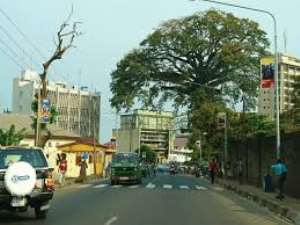
Soldiers are trained and equipped to defend their country or take part in foreign missions. The training they have makes them tough, even though they don’t always win during combat.
I didn't join the Ghana army. I tried to but I didn’t succeed. When I left my family, my experience was similar to military training and discipline on my journeys to Ivory Coast, Nigeria, Togo, Benin, Guinea, Gambia, and Sierra Leone.
I flew from Lagos to Freetown, Sierra Leone, in 1985. From the Lungi International Airport, I joined the ferry and landed in the capital, Freetown, in total darkness, (no electricity power), without any idea that Sierra Leone will be my second home to live and work for a living.
The Republic of Sierra Leone is a country in West Africa, sharing its borders with Guinea to the northeast, Liberia to the southeast and the Atlantic Ocean to the southwest.
As described by the 'Nations Encyclopedia,' Sierra Leone is composed of about 20 native ethnic groups, constituting 90% of the total population. The two largest tribes are the Mende (about 30%) and Temne (about 30%). Thirty percent of other tribes include the Bullom, Fulani, Gola, Kissi, Kono, Koranko, Krim, Kru, Limba, Loko, Malinke, Sherbro, Susu, Vai, Yalunka and the Creoles.
The Creoles are the descendants of freed Jamaican slaves that settled in the capital, Freetown area, in the late 18th Century and the account for the remaining 10 percent of the population are Liberia, Europeans, Lebanese, Pakistans, and Indians.
The British colonial masters of Sierra Leone, this partially hilly country, beautifully planned the city, Freetown, with good connecting streets. One could even walk throughout the city without joining a taxi or the “Poda-Poda,” their private public buses.
A young child of nine or ten could direct a stranger to any of some of the streets, such as Light-Foot Boston, Savage, Sanders, Wilkinson Road, Campbell, Pademba Road, down to Congo Town, and King Tom.
It is very easy to walk from the city to Cline Town, where the country’s largest seaport, Queen Elizabeth II Port, is, even though it is quite far from the town center. For example, going to the port from Circular Road, often pronounced in Creole as “Sakula Road,” would take you between fifteen to twenty minutes.
But from the town center going through Kissy Road could take you a little more than twenty minutes. The port is one of the busiest ports in West Africa since almost the entire business passes through it. Freetown was always bubbling with commercial activities.
The High Court, the General Post Office, the Head Quarters of the Barclays Bank, and almost all the governmental institutions were located close to the Siaka Stevens Street. Right in the middle of the city is the cotton tree, which is said to be over hundred years and served as a roundabout.
From the Lumley beach towards Wilkinson Road, Sanders Street, and Savage Street, the houses are located close to the streets. From downtown Siaka Stevens Street, towards Congo Town, at the Cotton Tree's roundabout, one would have to turn right to the Pademba prison, named after the road as Pademba Road. Adjacent to the tree was the National Museum.
At the age of 28, energetic and happy, I embraced Sierra Leone as my second country. Employed at the famous Red Lion Bakery, in Kingtom-Freetown, as a van driver. I supplied bread each morning at the bread shops at Siaka Stevens Street and Kissy Road.
Both Mrs. Ashwood and her daughter, Mrs. Pamela Grant, gave me the job and the kind Savage Family that gave me accommodation, assisted me to integrate. Eventually, I naturalized and became one of them. I lived in Freetown for a couple of years and loved their food and music.
To take control of the country, rebel activities led to the worst civil war in the history of Sierra Leone. The long decade civil war left unforgettable scars and remnants of amputees fighting for education and survival.
After the war, Sierra Leone put that bitter experience behind them without any idea that a disease called Ebola will strike the country. So you should understand the love I have for this country hit by a disease that didn't miraculously appeared from heaven, yet nobody wants to speak about its true origin.




 Akufo-Addo commissions Phase II of Kaleo solar power plant
Akufo-Addo commissions Phase II of Kaleo solar power plant
 NDC panics over Bawumia’s visit to Pope Francis
NDC panics over Bawumia’s visit to Pope Francis
 EC blasts Mahama over “false” claims on recruitment of Returning Officers
EC blasts Mahama over “false” claims on recruitment of Returning Officers
 Lands Minister gives ultimatum to Future Global Resources to revamp Prestea/Bogo...
Lands Minister gives ultimatum to Future Global Resources to revamp Prestea/Bogo...
 Wa Naa appeals to Akufo-Addo to audit state lands in Wa
Wa Naa appeals to Akufo-Addo to audit state lands in Wa
 Prof Opoku-Agyemang misunderstood Bawumia’s ‘driver mate’ analogy – Miracles Abo...
Prof Opoku-Agyemang misunderstood Bawumia’s ‘driver mate’ analogy – Miracles Abo...
 EU confident Ghana will not sign Anti-LGBTQI Bill
EU confident Ghana will not sign Anti-LGBTQI Bill
 Suspend implementation of Planting for Food and Jobs for 2024 - Stakeholders
Suspend implementation of Planting for Food and Jobs for 2024 - Stakeholders
 Tema West Municipal Assembly gets Ghana's First Female Aircraft Marshaller as ne...
Tema West Municipal Assembly gets Ghana's First Female Aircraft Marshaller as ne...
 Dumsor is affecting us double, release timetable – Disability Federation to ECG
Dumsor is affecting us double, release timetable – Disability Federation to ECG
